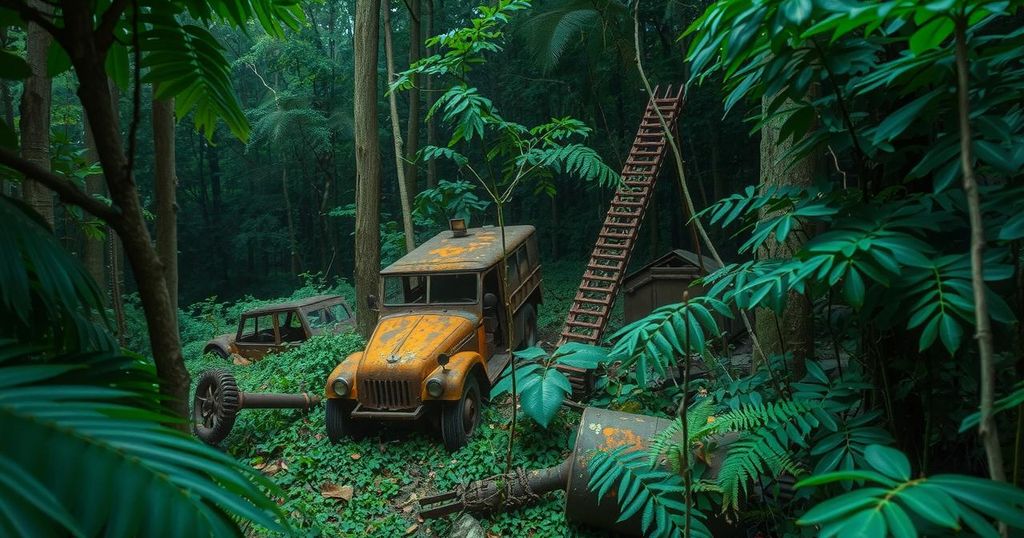World news
ADF, AFRICA, AFRICA CENTER FOR STRATEGIC STUDIES, AL JAZEERA, ALLIED DEMOCRATIC FORCES, BUKAVU, CIVIL WAR, CODECO, CONGO, CONGO (KINSHASA), COOPERATIVE FOR THE DEVELOPMENT OF CONGO, DEMOCRATIC REPUBLIC OF THE CONGO, DISPLACEMENT, DR CONGO, DRC, GOMA, HUMANITARIAN, HUMANITARIAN CRISIS, ITURI, KINSHASA, KIVU, M23, NORTH, PAUL NANTUL, PAUL NANTULYA, RWANDA, SEXUAL VIOLENCE, SOUTH KIVU, UGANDA, UK, UNITED NATIONS, WALIKALE, WAR
Sofia Rodriguez
0 Comments
The Resurgence of Conflict in the Democratic Republic of the Congo: A Return to Dark Times
The article discusses the resurgence of conflict in the DRC as M23 rebels advance, seizing cities and prompting fears of a larger regional war. Rwandan and Ugandan troop involvement harks back to historical conflicts, highlighting a humanitarian crisis exacerbated by resource exploitation. Calls for dialogue and accountability are crucial as the DRC faces internal and external pressures amidst ongoing violence.
The resurgence of conflict in the Democratic Republic of the Congo (DRC) has alarmingly echoed the traumatic episodes of the past. Communities within the DRC are facing the dire consequences as M23 rebels advance, having recently seized critical cities such as Goma and Bukavu. Despite Kinshasa’s offer of a $5 million reward for the arrest of M23 leaders, the advancement of these rebels remains unrestrained.
The instability is further heightened by the presence of Rwandan and Ugandan troops in the region. In particular, Ugandan forces have increased their deployment in Ituri province amid ongoing clashes with the Allied Democratic Forces (ADF) and other armed groups. The resurgence of these conflicts has sparked fears among political observers that the region may be on the verge of a larger war, reminiscent of the historical conflicts that led to the Great Africa War.
Paul Nantulya from the Africa Center for Strategic Studies described the dire situation, stating, “We are indeed seeing a replica of the Second Congo War with the same actors but in slightly different configurations.” The intertwined interests of neighboring countries in the conflict, including resource exploitation and ethnic tensions, lay the foundation for a repeating humanitarian disaster.
Throughout the three decades of low-intensity violence, over six million individuals have died. The roots of this conflict are deeply embedded in historical grievances, ethnic strife, and corruption. The rivalry between Rwanda and the DRC was significantly intensified during the genocides in the 1990s, and has since evolved into comic complexities involving various armed factions and regional interests.
Additionally, the international community’s efforts to intervene have often been flawed, with sanctions and military aid failing to stem the tide of violence. Instead, the exploitation of rich mineral resources has become a driving force behind the ongoing conflict, leading to endless cycles of aggression and humanitarian crises.
Recent legal actions against Uganda have resulted in a ruling that ordered reparations to the DRC for past conflicts, yet efforts to pursue accountability against Rwanda for supporting M23 remain uncertain, as the country does not recognize the jurisdiction of the International Court of Justice.
The current political landscape shows familiar players re-emerging. Rebel leader Corneille Nangaa, previously an elections commissioner, aligns with M23, underscoring the persistent intrusion of both Rwandan and Ugandan interests. Analysts assert that while Rwanda openly supports M23, Uganda’s involvement remains ambiguous, adding a layer of intrigue to the ongoing crisis.
Resources in the DRC are a focal point for conflict. The M23’s control over rich deposits has led to suspicions that illegal mining fuels their operations, estimating a monthly income of around $800,000 from gold sales. To resolve this pervasive crisis, a coordinated effort by African nations is deemed essential, as well as addressing the internal issues plaguing Kinshasa, which include widespread corruption and a legitimacy crisis for President Tshisekedi.
Calls for national dialogue and regional peace talks are ongoing, with significant importance placed on the treatment of civilians caught in the conflict. It is emphasized that without consideration for the Congolese populace, efforts to stabilize the DRC will falter. As Kambale Musavuli stated, “DRC needs a break. Not just for themselves, but for the entire African continent.”
The current turmoil in the Democratic Republic of the Congo is not merely a recurrence of past conflicts but an extension of a prolonged crisis marked by violence and instability. The involvement of Rwandan and Ugandan forces has revived fears of a larger regional war. For a sustainable resolution, a comprehensive approach is required, prioritizing both diplomatic efforts among African nations and the immediate needs of the Congolese people, who endure the consequences of these recurring conflicts.
Original Source: www.aljazeera.com




Post Comment